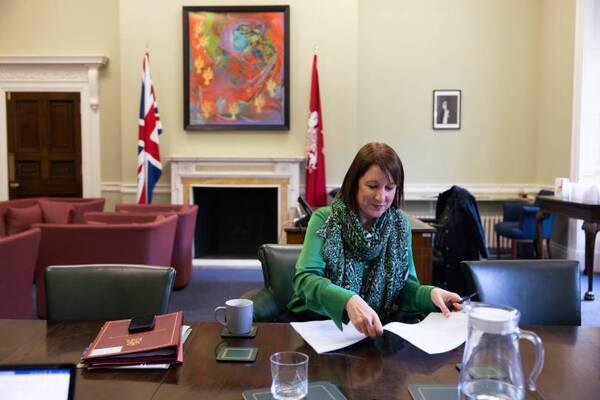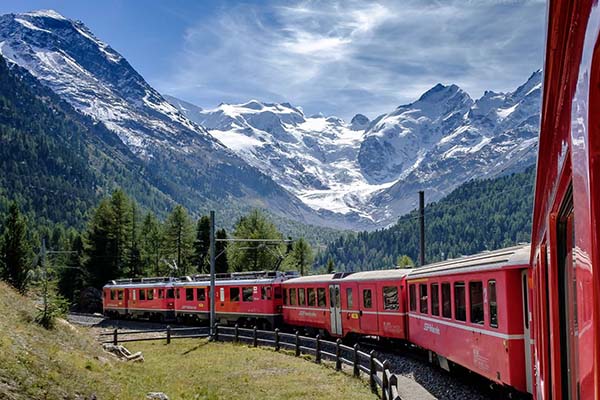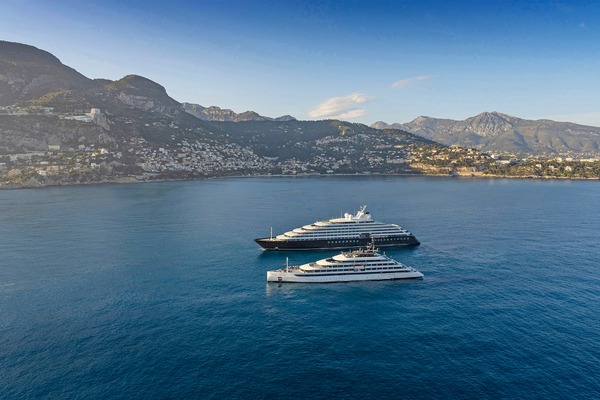The rise of rail and 'coolcations', and why agents will have to 'work for it' in 2025
 Sarah Dennis
Sarah DennisAfter what will, for many, have been another challenging but ultimately successful year, what can agents hope for in 2025, and what should the trade be mindful of – at home and around the world at large – when addressing clients’ ever-changing needs?
These were just some of the key topics the panel at TTG’s Agenda 2024 Winter Breakfast took on earlier this week.
Held in London in partnership with PwC, our industry experts looked back at what went well – and not so well – this year, mindful of what might lie in store in 2025.
And while they were in agreement there was much to be positive about, they warned travel businesses would have to be prepared to work hard for their keep with the new year – and peaks – just a matter of weeks away.
So here are six things we picked out that could have a material impact on how agents go about 2025.
2024 – another strong year, but customers want more
Alistair Rowland, Abta chair and chief executive of TTG Top 50 Travel Agencies 2024 Top Online Agency Blue Bay Travel, said the business was on course for another great year, which he revealed would likely end "about 25% up" on 2023.
“I think everybody’s a bit surprised about the recovery from Covid, and the speed of that recovery,” he said, highlighting challenges with airlines and legal governance.
He also warned other agents to expect more bullish demands from customers. “People are spending," he told delegates. "They’re just demanding a lot of value – customers are demanding more."
PwC partner Eleanor Scott said she expected “value” to be the main marketing message consumers react to.
"They want value and special offers – it’s definitely a higher priority,” she said. “They want to be inspired, they want to know they will have a great holiday, but they want good value and to know they’re protected if something goes wrong.”
Hazel McGuire, Intrepid Travel general manager UK and Ireland, said that while the operator was on course for another year of record performance, Intrepid had not seen “the exact trend curve" it had expected.
"We saw a few lumps and bumps," she said. “It’s had a couple of ups and downs, but overall, we’ll end the year positively."
’Disappointing’ Budget will necessitate efficiencies
PwC hospitality, travel and leisure lead, Rick Jones, while acknowledging the impact of the Budget on travel businesses, stressed firms would have to seek efficiencies in terms of how they use technology to both facilitate and enhance their clients’ experience.
McGuire agreed, telling guests Intrepid had a “huge” roadmap for technology and efficiency investment. However, she admitted some cost rises resulting from the Budget were “likely to be passed on to customers”.
She added the time had passed for worrying about getting back to how things were pre-Covid in terms of headcount and how businesses go about their operations.
"We’re looking generally at how we can be more efficient and have invested a lot in technology over the past year," she said. "We need to step back now and say we’re at the right level for headcount, so let’s see what we can do to get efficiency levels up.”
Rowland said a "disappointing Budget" had created immediate, salient risks for businesses – most notably from the rises in National Living Wage. "If you’ve got incentivised people selling, you’ve got a good incentive scheme based on productivity or profit, and you’ve got a supervisory rate, a management rate and an executive rate, all of that collapses.
"You’ve almost got to take out a level to accommodate that – or accept your more senior tiers are going to live with 1% or 2% [pay] increases while the bottom tiers get more. Or you take incentives off the bottom tier, and you don’t want to do that.”
On efficiency, Rowland warned: “Everybody needs to be very proactive now. Those that are putting their heads in the sand and saying they’ll look at it after peaks are making the wrong choice because it will be upon them."
Travel can’t ignore sustainability – even if customers don’t prioritise it (yet)
Scott highlighted the 57% of respondents to PwC’s accompanying consumer research who said sustainability issues had now impacted their holiday plans.
This, she said, was taking many forms, with 16% pointing to changes in how often they travel. Similar proportions have opted to change how far they travel and their method of transport.
And although Scott went on to highlight how more than 50% of respondents said they still valued the experience over sustainability, she said people’s expectations that operating sustainability will become the default was a trend "that will only increase". "We can’t ignore it."
Scott added there was more onus on travel businesses than ever before to demonstrate their sustainability practices or credentials, with almost half of respondents saying they expect travel companies to be sustainable, a figure rising to almost two-thirds (63%) among 25 to 34-year-old respondents.
However, only 28% said they actively look for travel companies with sustainable credentials, while just 19% were adamant they would not use companies without sustainability credentials.

McGuire agreed, saying Intrepid customers did not choose the operator “first and foremost" for its sustainability credentials. "At the end of the day, the customer wants a great holiday," she said.
"What we do on the ground is we weave that narrative into the experience and the itineraries. We introduce them to communities who talk to travellers about what tourism brings to them. It’s about going in in a very natural way – you can make decisions to build product that is less harmful or better for the communities we visit".
Asked by Jones about repeat rates, McGuire agreed the ethos behind these itineraries was one of the reasons customers come back. “They felt they had given back in some way, or diminished the negative impact of their holiday,” she said, although she revealed this was not typical feedback for travellers choosing Intrepid as a new customer.
"I don’t think us going out with a huge message on ‘sustainability’ is the right thing," she cautioned. "It’s more about giving that experience and letting people see for themselves."
Out with the Med, in with the ’coolcations’?
McGuire played down there being a "wholesale" departure from the Mediterranean right now, but stressed that in her "genuine" opinion, a "longer-term" shift was under way.
"If we continue to see temperatures rising as much as we have, I believe there will be a longer trend of people moving away from those destinations in the peak of summer," she said. "We saw an increase of about 140% in departures in September and October in Greece, for example [rather than during peak months].”
Addressing the coverage of overtourism in the media, Rowland asserted the message was not that Spain and Spanish people "do not want tourists", warning these messages are "narrower" than the reality.
"Some helpful things have been happening – cruise ships landing in key destinations [where there have been] too many at any one time, we’ve seen examples of that stopping, or destinations taxing for it," he said.
"Abta will take a place between supporting the industry and supporting the destinations – but there’s more dialogue than there has been before."
Rail travel – ’there is history here’
The panel were united in their belief that rail will become an increasingly common component of people’s holidays. Jones, who revealed he took his first holiday by rail this year, said rail would increasingly "tuck into" a wider shift towards more sustainable travel.
"There is a history here – how many people went Interrailing when they were young?" Jones asked the audience. “There’s a young aspect to rail travel, and it’s also a very attractive holiday prospect for an older person too, so it’s a question of how you can get more of that mainstream. It’s a rising tide."
Jones added "part of the secret" would lie with tourist boards, and how they encourage rail travel in conjunction with industry.

McGuire highlighted some of the “amazing feedback” Intrepid customers give when they travel by rail, which has long been a feature of the Intrepid travel style. This summer, the operator launched 40 rail-inclusive itineraries, including three new trips.
However, she acknowledged there were technological challenges for rail specialists, such as Intrepid partner Byway, such as the sometimes unfavourable experience regular rail users face in the UK. “If we can get rail better in this country, it will make people more confident to use it to get across Europe," she said.
Rowland agreed, raising both rail’s growing usage and appeal. “Rail is clearly a growing sector, it’s just a tougher message because the UK doesn’t experience great rail, so clients have not seen what they can get.”
The new Labour government has pledged to renationalise the UK’s rail network, and this week nominated the first rail operator that will come back into public hands.
2025 will be a good year – but travel will have to ’work for it’
Despite the booming Cyber November period for travel deals, which the panel agreed had firmly carved out its own niche as a "relevant" promotional window, there is no shortage of optimism about peaks next year – or for trading in the year ahead – bar the usual warnings it is unlikely to be "plain sailing".
McGuire said January sales and the usual holiday booking period was "absolutely ingrained" in people. "I think people expect those deals in January and I do expect a good peaks." she said, adding: "I think 2025 will be a good year – I don’t doubt it will have its ups and downs, and I don’t think it is going to be plain sailing. We’ll have to work for it.”
Rowland was also confident of strong 2025 trading. “What I hope is that, more than anything, prices generally nudge up and discounting nudges down. Everybody, including the airlines and tour operators, is facing the same problems."
He said businesses, particularly SMEs, would have to assess their cost bases and plan early to maximise the opportunities available to them in 2025.
Sign up for weekday travel news and analysis straight to your inbox

Sarah Dennis
Supplier Directory
Find contacts for 260+ travel suppliers. Type name, company or destination.















